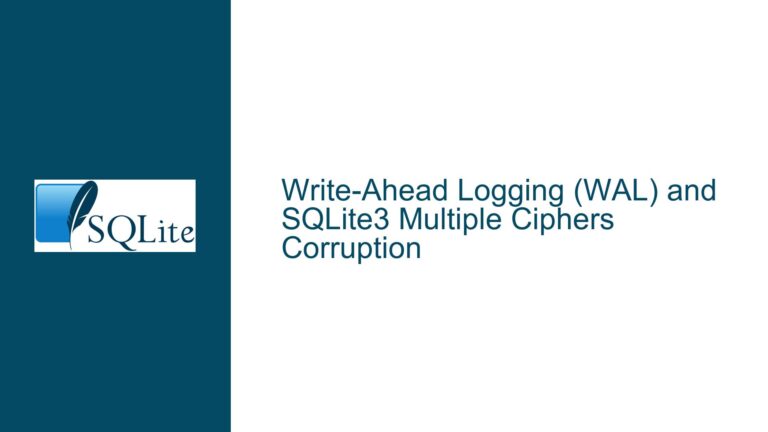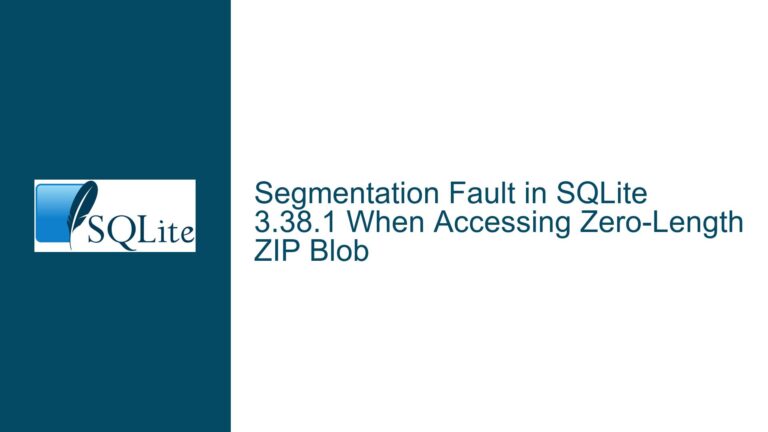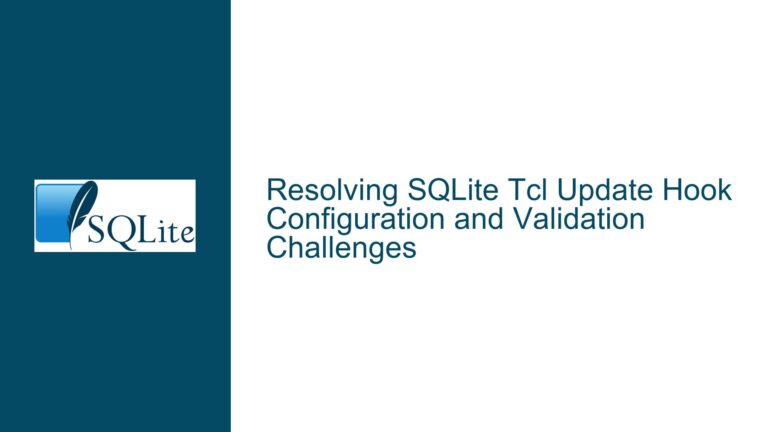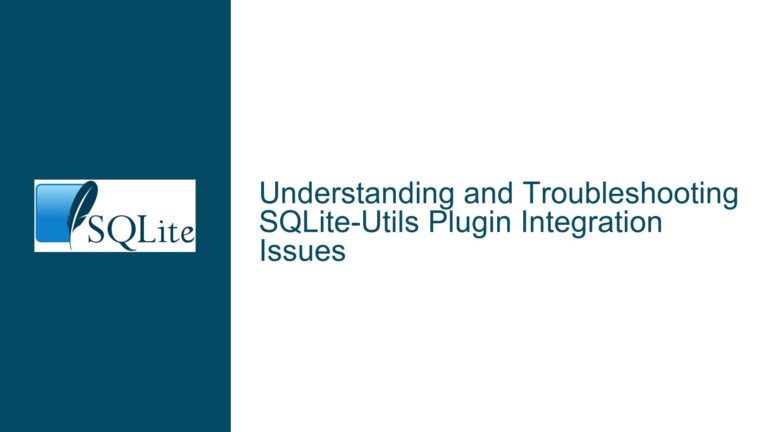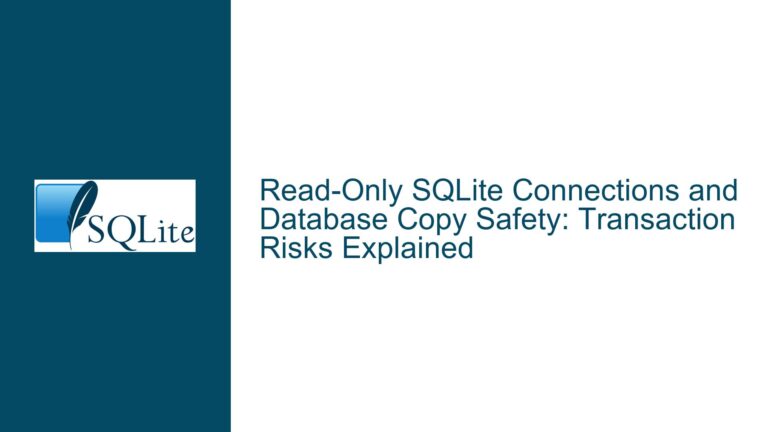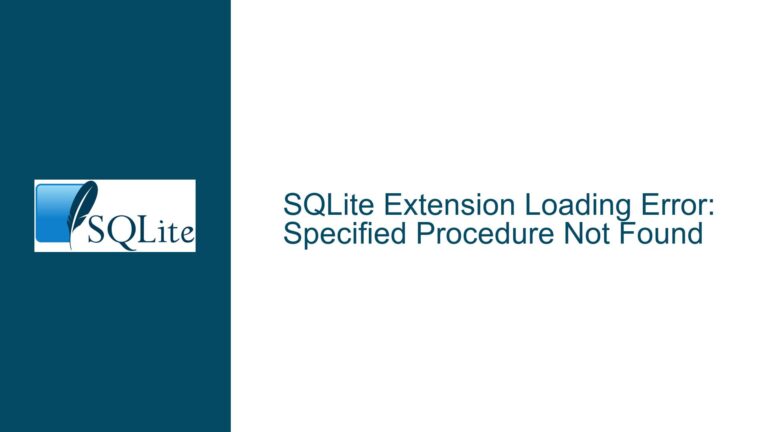SQLite Interop DLL Copy Failure in Visual Studio 16.10
Issue Overview: SQLite Interop DLL Files Not Copied During Build in Visual Studio 16.10
The core issue revolves around the failure of the CopySQLiteInteropFiles target in the Stub.System.Data.SQLite.Core.NetFramework NuGet package to copy the SQLite.Interop.dll files to the relevant output directories during the build process in Visual Studio 16.10. This issue manifests specifically when developers attempt to build projects that have a dependency on the System.Data.SQLite library. The SQLite.Interop.dll files are critical for the proper functioning of SQLite in .NET applications, as they contain the native interop code necessary for SQLite to operate within the .NET runtime.
The problem was first reported after the release of Visual Studio 16.10.0, where developers noticed that the build process no longer copied the SQLite.Interop.dll files to the output directories. This issue is particularly problematic because it breaks the build process for any project relying on SQLite, effectively halting development until a workaround or fix is implemented. The issue is tied to a change in the behavior of MSBuild, the build system used by Visual Studio, which no longer meets a specific condition required for the CopySQLiteInteropFiles target to execute correctly.
The root cause of the issue lies in the way MSBuild handles relative paths and trailing slashes in the Stub.System.Data.SQLite.Core.NetFramework.targets file. Specifically, the SQLiteTargetFramework property, which is used to determine the target framework directory, is missing a trailing slash. This missing slash causes the condition that checks for the existence of the target directory to fail, preventing the CopySQLiteInteropFiles target from executing as intended.
Possible Causes: MSBuild Path Handling and Trailing Slash Issue
The primary cause of the issue is a change in the behavior of MSBuild in Visual Studio 16.10.0, which affects how relative paths and trailing slashes are handled. The Stub.System.Data.SQLite.Core.NetFramework.targets file contains a line that defines the SQLiteTargetFramework property using the MSBuild::MakeRelative function. This function generates a relative path between two directories, but the resulting path does not include a trailing slash. The absence of this trailing slash causes the condition that checks for the existence of the target directory to fail, preventing the CopySQLiteInteropFiles target from executing.
The issue is further compounded by the fact that the Stub.System.Data.SQLite.Core.NetFramework NuGet package is designed to work across multiple versions of Visual Studio and MSBuild. This cross-version compatibility introduces additional complexity, as changes in MSBuild behavior can have unintended consequences for the package’s build targets. In this case, the change in MSBuild’s handling of relative paths and trailing slashes has exposed a fragility in the Stub.System.Data.SQLite.Core.NetFramework.targets file, which was previously working as intended.
Another potential cause of the issue is the nesting of single quotes in the SQLiteTargetFramework property definition. The proposed fix involves using the MSBuild::EnsureTrailingSlash function to add a trailing slash to the SQLiteTargetFramework property. However, this solution introduces additional complexity due to the nesting of single quotes, which could potentially cause issues with MSBuild’s parsing of the property definition. This complexity has led to concerns about the reliability and portability of the proposed fix, particularly given the need to maintain compatibility with existing versions of MSBuild and Visual Studio.
Troubleshooting Steps, Solutions & Fixes: Applying the Trailing Slash Fix and Monitoring MSBuild Updates
The most effective solution to the issue is to modify the Stub.System.Data.SQLite.Core.NetFramework.targets file to ensure that the SQLiteTargetFramework property includes a trailing slash. This can be achieved by using the MSBuild::EnsureTrailingSlash function, which adds a trailing slash to a path if one does not already exist. The modified line in the Stub.System.Data.SQLite.Core.NetFramework.targets file should look like this:
<SQLiteTargetFramework>$([MSBuild]::EnsureTrailingSlash('$([MSBuild]::MakeRelative('$(MSBuildThisFileDirectory)..', '$(MSBuildThisFileDirectory)'))'))</SQLiteTargetFramework>
This modification ensures that the SQLiteTargetFramework property always includes a trailing slash, regardless of the behavior of MSBuild. This fix has been tested and confirmed to work in Visual Studio 16.10.0, and it should be applied to all instances of the Stub.System.Data.SQLite.Core.NetFramework.targets file under the buildTransitive folder in the NuGet package.
However, it is important to note that this fix introduces additional complexity due to the nesting of single quotes in the property definition. Developers should exercise caution when applying this fix, as copy-pasting the modified line may result in unintended changes to the file. To avoid potential issues, developers should manually verify that the modified line is correctly formatted and that the trailing slash is present.
In addition to applying the trailing slash fix, developers should monitor updates to MSBuild and Visual Studio for any changes that may affect the behavior of the CopySQLiteInteropFiles target. A pull request has been submitted to fix the underlying issue in MSBuild, and it is expected to be included in a future release of Visual Studio 16.10.2 (.NET SDK 5.0.302). Once this update is released, developers should update their installations of Visual Studio and MSBuild to ensure that the issue is fully resolved.
In the meantime, developers can use the trailing slash fix as a temporary workaround to unblock their builds. However, they should be aware that this fix may need to be revisited if further changes are made to MSBuild or the Stub.System.Data.SQLite.Core.NetFramework NuGet package. By staying informed about updates and applying the necessary fixes, developers can ensure that their builds continue to function correctly and that their projects remain on track.
In conclusion, the issue with the CopySQLiteInteropFiles target in Visual Studio 16.10.0 is caused by a change in MSBuild’s handling of relative paths and trailing slashes. The most effective solution is to modify the Stub.System.Data.SQLite.Core.NetFramework.targets file to ensure that the SQLiteTargetFramework property includes a trailing slash. Developers should apply this fix with caution and monitor updates to MSBuild and Visual Studio for any further changes that may affect the behavior of the CopySQLiteInteropFiles target. By taking these steps, developers can resolve the issue and ensure that their builds continue to function correctly.

